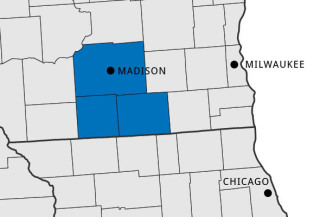We enrich the lives of Veterans by creating a Super Bond® with custom trained working animals.
+ Service Area Highlighted In Blue

Serving the following counties: Dane, Green, and Rock. The Madison, WI.
Pets for Vets Chapter is a small dedicated group who share one common goal. We give back to those who gave to us; we pay it forward to our Veterans by finding and training forever animal companions for them.
We are retired school teachers, entrepreneurs and administrative assistants. We are speech language pathologists, correction officers and dog trainers/behaviorists. We are marketing managers and self-employed accountants. We are research assistants. Some of us are in the throws of professional life, while others are retired. Several of us have served in the military and some have family currently serving.
We love to garden, woodwork, play golf, drive convertibles in the summer, go to concerts and find new restaurants. Travel is high on the list for many of us. Some of us are learning and practicing ASL (American Sign Language) and crochet and glass art. Others garden and grow things of beauty and things to eat. We live in cities and in the country where we tend our chickens and ducks. We play rec soccer and visit museums. Most of us have 4-legged companions.
We serve different roles within our chapter: board members, officers, trainers and members at large. Our trainers continue to study the field of dog training by attending workshops and taking on-line classes: two of our trainers participate in dog agility competitions. We attend fundraising events and sew scarves for our matched doggies. We work together for one common cause. We love our Veterans and we love animals. It is a perfect match.
A huge thank you to our sponsors! Without your support our chapter wouldn't be possible.
Pets for Vets is thrilled to serve Veterans in your area. If you would like to become a supporter of Pets for Vets Madison and for your organization’s name, logo, seal, or information to appear on this page, please contact
sponsors@petsforvets.com.